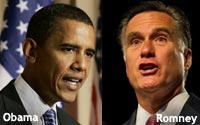 In the 2008 election, President Obama's embrace of Facebook and other online tools helped him raise money, build support among young voters, and
ultimately beat John McCain to win the presidency. Four years later, it appears he's picking up where he left off.
In the 2008 election, President Obama's embrace of Facebook and other online tools helped him raise money, build support among young voters, and
ultimately beat John McCain to win the presidency. Four years later, it appears he's picking up where he left off.
A new study by the Pew Research Center's Project for Excellence in Journalism indicates that Obama is well ahead of Mitt Romney on the digital campaign trail.
The Obama campaign is posting almost
four times as much content and is active on nearly twice as many platforms, according to the Pew report, which analyzed the content and volume of candidate communications on their Web sites and social
media channels from June 4 to 17.
The biggest gap is on Twitter, where Obama has averaged 29 tweets per day overall: 17 on @BarackObama (the account associated with his presidency) and
@Obama2012 (his campaign account). By contrast, the Romney campaign averaged only 1 tweet per day. Likewise, Obama has had about twice as many blog posts on his campaign site and more than twice as
many YouTube videos.
advertisement
advertisement
The two candidates were closer in the level of Facebook activity, where both averaged about two posts a day.
Despite Obama's advantage in digital messaging, the
study found that neither candidate is using social media to amplify input from voters. In other words, it has been more one-way than two-way communication. The candidates, for instance, rarely
“retweet” posts from citizens. Only 3% of Obama's 404 campaign tweets during the study period were retweets. Romney only had one.
Voter content also had only a minimal presence on
Romney's digital channels. While Obama made more substantial use of input from people, the report said it was limited to one area: the “news blog” on its site, where content could be
completely controlled.
This is the fourth presidential election cycle in which the Project for Excellence in Journalism has looked at the content of the digital campaign. This year it
broadened its analysis to include content posted on Facebook, Twitter and YouTube, as well as blog posts and material featured on campaign site home pages.
As far as the 2012 election goes,
things are just heating up.
“As the conventions drew closer, Romney’s campaign took steps to close the technology gap, and may well take more with the addition of Paul Ryan to the
ticket,” said PEJ Deputy Director Amy Mitchell. “But there is a long way to go before the Romney team matches the level of activity of the Obama campaign.”
Among other
findings from the study:
Campaign Web sites remain the central hub of digital political messaging.
Even if someone starts on a campaign’s social network page,
they often end up back on the main Web site -- to donate money, to join a community, to volunteer or to read anything of length. A July redesign of the Obama page emphasized the centrality of the
campaign Web site further. Rather than sending users to the campaign’s YouTube channel, the video link now embeds the campaign videos directly into the site.
Romney on the
attack.
While both campaigns’ digital content focused mainly on their own candidate, roughly one-third of the posts from the Romney campaign were about Obama -- largely
attacking him for a policy stance or action. About half as many of the Obama campaign’s posts, 14%, took aim at Romney during the period studied.
It's the economy, stupid.
Both candidates have focused on the economy, with 24% of all Romney posts and 19% of Obama's addressing the topic. However, the campaigns took different approaches as Romney has
given more attention to jobs, while Obama's economic messages were almost equally divided between jobs and broader economic issues, such as the importance of the middle class.
Obama’s digital strategy targets specific voter groups more than Romney’s.
The Obama site allows visitors to join 18 different constituencies including
African-Americans, women, LGBT, Latinos, veterans/military families or young Americans. By clicking to join a group, a user then receives targeted content. The Romney campaign had no similar options
at the time of the study, but has since added feature pages for nine groups. Users, however, can still only join the general “Team Romney” rather than a particular voter segment.